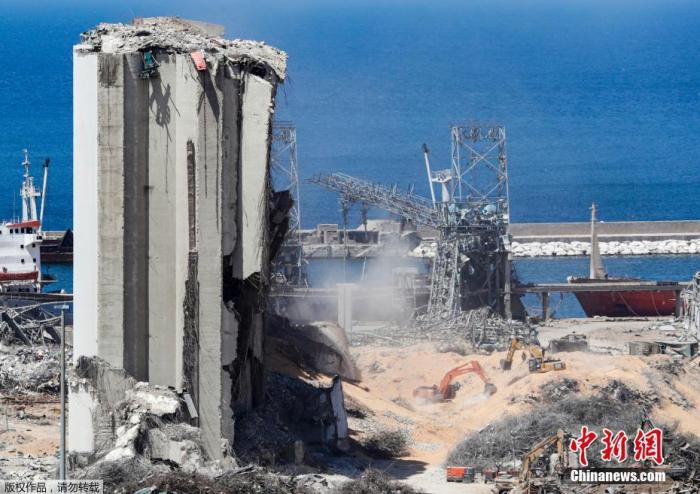To avoid repeating the mistakes of Lebanon, multinational ports urgently clean up dangerous chemicals
[Global Times Special Correspondent in Egypt Huang Peizhao] While the Beirut explosion in Lebanon shocked the world, it also sounded a safety alarm. Many countries have recently begun to take actions to remove and transfer dangerous goods from their ports and airports to eliminate potential hazards and avoid repeating the same. The mistakes of Lebanon.
According to reports on the 17th by the UAE’s "National", Qatar’s Al Jazeera and other media, in order to learn from Beirut’s profound lessons, some countries such as Egypt, Iraq, and India have taken measures to deal with dangerous goods stored in important ports and airports. Perform transfer or cleanup.
On August 16, 2020, local time, in Beirut, the capital of Lebanon, an excavator carried out demolition work at the explosion site in Beirut Port.
Egyptian Finance Minister Mohamed Matt said in Parliament on the 16th that Egypt is implementing new customs procedures to prevent the storage or abandonment of dangerous and explosive materials in ports. Matt said: "What happened in Beirut made us look at our own situation. We have actually removed a large number of abandoned and neglected dangerous materials in the port. Some of them have been sent to the Ministry of Petroleum, National Defense, and the Ministry of Interior. Department, by December next year, all Egyptian ports will be cleaned up.” According to the report, a few days after the Beirut explosion, the Egyptian Ministry of Civil Aviation stated that it had ordered a review of various chemical materials at the airport and the transfer of dangerous goods. Go to safe storage.
Iraq is also taking action. The country’s customs director-general Khalid Salah said that since the Beirut bombing, they have checked 6,431 containers at the Umm Qesar Port, 550 kilometers south of Baghdad, and identified 513 " "Dangerous containers", of which 20 containers owned by the Ministry of Petroleum and Electricity of Iraq were immediately transported away because they contained explosives or dangerous goods. Salah also called on the owners of these goods and related departments to immediately remove the remaining containers to avoid safety incidents. It is also reported that hundreds of tons of ammonium nitrate have been stranded in the southern Indian city of Chennai for five years. It was only last week that Indian customs officials took action to transport the dangerous chemicals to Hyderabad.
However, not all dangerous goods have been effectively resolved. After the Beirut bombing of the "Safir" tanker parked in the Red Sea in Yemen and the oil spill in Mauritius, it once again caused concern. Since the tanker was controlled by the Yemeni Houthi in 2015, it has been in a state of unmanned inspection. At present, there are still 1.1 million barrels of crude oil on the tanker, which poses a huge safety hazard. However, the Houthi has not agreed to the UN expert team to inspect. The safety status of the tanker.

